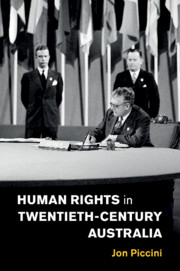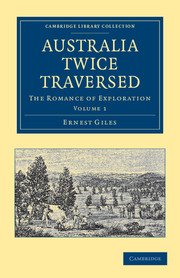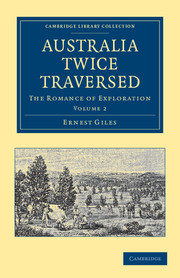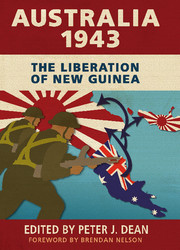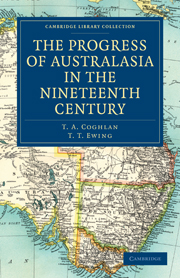Human Rights in Twentieth-Century Australia
Part of Human Rights in History
- Author: Jon Piccini, Australian Catholic University, Melbourne
- Date Published: August 2021
- availability: Not yet published - available from October 2024
- format: Paperback
- isbn: 9781108460279
Paperback
Other available formats:
Hardback, eBook
Looking for an inspection copy?
This title is not currently available for inspection. However, if you are interested in the title for your course we can consider offering an inspection copy. To register your interest please contact [email protected] providing details of the course you are teaching.
-
This groundbreaking study understands the 'long history' of human rights in Australia from the moment of their supposed invention in the 1940s to official incorporation into the Australian government bureaucracy in the 1980s. To do so, a wide cast of individuals, institutions and publics from across the political spectrum are surveyed, who translated global ideas into local settings and made meaning of a foreign discourse to suit local concerns and predilections. These individuals created new organisations to spread the message of human rights or found older institutions amenable to their newfound concerns, adopting rights language with a mixture of enthusiasm and opportunism. Governments, on the other hand, engaged with or ignored human rights as its shifting meanings, international currency and domestic reception ebbed and flowed. Finally, individuals understood and (re)translated human rights ideas throughout this period: writing letters, books or poems and sympathising in new, global ways.
Read more- Presents the first critical history of how human rights emerged in Australia
- Locates how key moments in Australian history engaged with, were informed by or rejected the idea of human rights
- Contributes to an emerging scholarship that situates the emergence of human rights not in the longue duree of Western civilization but in contemporary events
Reviews & endorsements
'In this fascinating account of how global ideas travel, Jon Piccini illuminates how Australians invoked universal human rights in pursuit of political and social reforms. By carefully charting the ways the concept was deployed by groups ranging from Indigenous Australians to anti-abortion evangelicals, Piccini offers a fresh reading of the capacities and the limits of this supple moral language.' Barbara Keys, author of Reclaiming American Virtue: The Human Rights Revolution of the 1970s
See more reviews'This major contribution to understanding Australia's national navigation of the human rights idea and its place within wider global rights represents a strikingly impressive intervention. It interacts with some of the key trends within the grander constellation of human rights history and connects with the changing contours of human rights as an international discourse and transnational social movement.' Roland Burke, author of Decolonisation and the Evolution of International Human Rights
'Australia has no bill of rights, but human rights talk permeates its culture and politics. Jon Piccini has for the first time explained the history of this paradox, in a significant contribution to our understanding of how the appeal to human rights became both pervasive and contested in modern Australia.' Frank Bongiorno, author of The Eighties: The Decade That Transformed Australia
'Human Rights in Twentieth-Century Australia is an important book and Jon Piccini has set out an agenda for further research which I hope students of Australian history will seek to follow. He has also presented Australias … record on human rights to an international audience and this will no doubt inspire future conversations and comparisons in global settings.' Julia T. Martínez, History Australia
'Jon Piccini's excellent history of human rights in twentieth century Australia joins a growing number of 'national human rights histories' that seek to show how domestic political and civil movements engaged with the emergent global discourse of human rights … This book, which draws on a wide range of Australian newspapers, manuscript collections, archives, and publications from a wide range of civil liberties, human rights, indigenous rights, and sectarian organizations, should appeal to historians of modern Australian politics and foreign policy, indigenous transnationalism, and human rights more generally.' Brad Simpson, Journal of Contemporary History
Customer reviews
Not yet reviewed
Be the first to review
Review was not posted due to profanity
×Product details
- Date Published: August 2021
- format: Paperback
- isbn: 9781108460279
- length: 219 pages
- dimensions: 229 x 152 x 11 mm
- weight: 0.332kg
- availability: Not yet published - available from October 2024
Table of Contents
Acknowledgements
Introduction: bereft of words
1. Inventing rights
2. Cold War rights
3. Experimental rights
4. Who's rights? 5. Implementing rights
Epilogue: cascade or trickle?
Sorry, this resource is locked
Please register or sign in to request access. If you are having problems accessing these resources please email [email protected]
Register Sign in» Proceed
You are now leaving the Cambridge University Press website. Your eBook purchase and download will be completed by our partner www.ebooks.com. Please see the permission section of the www.ebooks.com catalogue page for details of the print & copy limits on our eBooks.
Continue ×Are you sure you want to delete your account?
This cannot be undone.
Thank you for your feedback which will help us improve our service.
If you requested a response, we will make sure to get back to you shortly.
×
